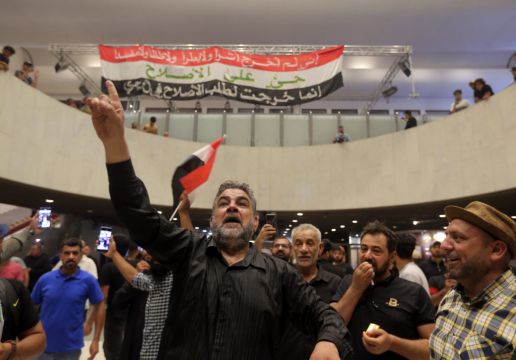Hundreds of followers of an influential Shiite cleric are camped out inside the Iraqi parliament after toppling security walls around the building and storming in on Saturday.
The protesters — followers of cleric Muqtada al-Sadr — pledged to hold an open-ended sit-in to derail efforts by their rivals from Iran-backed political groups to form the country’s next government.
The developments have plunged the country deeper into a political crisis as a power struggle unfolds between the two major Shiite groups.

On Sunday, the sit-in appeared more of a joyous celebration than a political protest, with followers of Mr al-Sadr dancing, praying and chanting slogans in praise of their leader.
In between, they took naps on mattresses lining the grand halls.
It was a scene starkly different from the one on Saturday when the protesters used ropes and chains to topple cement walls around the heavily fortified Green Zone in Baghdad, then flooded into the assembly building.
It was the second such breach last week, but this time they did not disperse peacefully.

Security forces fired tear gas and stun grenades at first, to try to repel the demonstrators. The Ministry of Health said about 125 people were injured in the violence — 100 protesters and 25 members of the security forces.
Within a few hours, the police backed off, leaving the parliament to the protesters.
Outside the building, garbage from food packages and other trash littered the street leading up to the parliament gate while trucks bused in giant cauldrons of steaming rice and beans to feed the protesters.
There was also humour inside the parliament on Sunday among Mr al-Sadr’s followers.
One protester, Haidar Jameel, assumed the seat of parliament speaker Mohammed Halbousi — among the most powerful political figures in Iraq — and looked on at his rowdy fellow protesters in the assembly.

After Mr al-Sadr’s followers took over the parliament, Mr Halbousi suspended future sessions until further notice.
Boxes of bottled water were piled up on the street and tents were erected. A small child handed out sweets, and teenagers sold juice from sacks.
The takeover of the parliament showed Mr al-Sadr was using his large grassroots following as a pressure tactic against his rivals in the Co-ordination Framework — an alliance of Shiite parties backed by Iran and led by former prime minister Nouri al-Maliki — after his party was not able to form a government despite having won the largest number of seats in federal elections last hOctober.
Neither side appears willing to concede and Mr al-Sadr seems intent on derailing government formation efforts by the Iran-backed groups.







